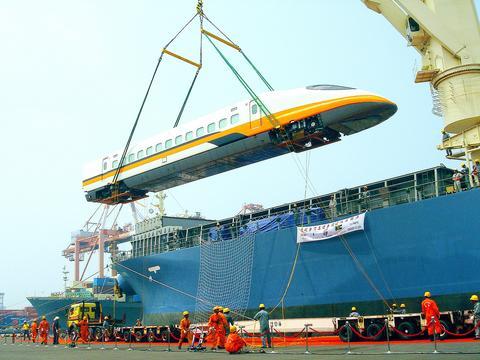Taiwan High Speed Rail Corp (THSRC) celebrated the arrival of its first batch of bullet trains at Kaohsiung Port yesterday.
"We're so excited about the coming of Taiwan's first high-speed trains, and we are confident that we can begin service as scheduled," THSRC chairwoman Nita Ing (殷琪) said during a ceremony at the port yesterday.
Two 700-T locomotives and 10 carriages arrived Monday night, with a combined length of 304m and combined weight of 503 tonnes. The units left Kobe, Japan, on May 18.

PHOTO: JESSIE HO, TAIPEI TIMES
The company has ordered 30 sets of bullet trains from Japan's Kawasaki Heavy Industries.
The second batch of trains is expected to arrive in July, and the remaining 28 sets are expected by September next year, THSRC spokesman Edward Lin (
THSRC will showcase one locomotive in the Hsiaokang District of Kaohsiung City tonight and transport the carriages to its main workshop in Yenchao township, Kaohsiung County, to be assembled on Saturday.
THSRC plans to start a yearlong trial in September on 60km of track between Tainan and Kaohsiung.
If the test goes smoothly, the white bullet trains with orange stripes will begin service between Taipei and Kaohsiung at the end of October next year and will boast speeds of up to 300kph.
Travel time between the two cities would be 90 minutes, while the Taipei-Taichung route would take 46 minutes.
While the 345km line is 60 percent complete and the main infrastructure 99 percent finished, there are concerns about whether the company has enough capital to finish the NT$513 billion railway.
Last year THSRC initiated a NT$21.7 billion fundraising plan, which would sell preferred shares with a guaranteed 9.5 percent dividend for the first two years. Ing said earlier this month that the company had raised only NT$2.9 billion.
Given the lukewarm response, the company is considering opening up the share sale to overseas investors, Ing said yesterday.
THSRC plans to raise NT$7.5 billion by July, NT$10.2 billion by September, and another NT$10 billion by November.
China Steel Corp (
"This is a good investment ... the risk of the investment dwindles with the completion of the project," China Steel chairman Lin Wen-yuan (

The US government has signed defense cooperation agreements with Japan and the Philippines to boost the deterrence capabilities of countries in the first island chain, a report by the National Security Bureau (NSB) showed. The main countries on the first island chain include the two nations and Taiwan. The bureau is to present the report at a meeting of the legislature’s Foreign Affairs and National Defense Committee tomorrow. The US military has deployed Typhon missile systems to Japan’s Yamaguchi Prefecture and Zambales province in the Philippines during their joint military exercises. It has also installed NMESIS anti-ship systems in Japan’s Okinawa

‘WIN-WIN’: The Philippines, and central and eastern European countries are important potential drone cooperation partners, Minister of Foreign Affairs Lin Chia-lung said Minister of Foreign Affairs Lin Chia-lung (林佳龍) in an interview published yesterday confirmed that there are joint ventures between Taiwan and Poland in the drone industry. Lin made the remark in an exclusive interview with the Chinese-language Liberty Times (the Taipei Times’ sister paper). The government-backed Taiwan Excellence Drone International Business Opportunities Alliance and the Polish Chamber of Unmanned Systems on Wednesday last week signed a memorandum of understanding in Poland to develop a “non-China” supply chain for drones and work together on key technologies. Asked if Taiwan prioritized Poland among central and eastern European countries in drone collaboration, Lin

The Chien Feng IV (勁蜂, Mighty Hornet) loitering munition is on track to enter flight tests next month in connection with potential adoption by Taiwanese and US armed forces, a government source said yesterday. The kamikaze drone, which boasts a range of 1,000km, debuted at the Taipei Aerospace and Defense Technology Exhibition in September, the official said on condition of anonymity. The Chungshan Institute of Science and Technology and US-based Kratos Defense jointly developed the platform by leveraging the engine and airframe of the latter’s MQM-178 Firejet target drone, they said. The uncrewed aerial vehicle is designed to utilize an artificial intelligence computer

Renewed border fighting between Thailand and Cambodia showed no signs of abating yesterday, leaving hundreds of thousands of displaced people in both countries living in strained conditions as more flooded into temporary shelters. Reporters on the Thai side of the border heard sounds of outgoing, indirect fire yesterday. About 400,000 people have been evacuated from affected areas in Thailand and about 700 schools closed while fighting was ongoing in four border provinces, said Thai Rear Admiral Surasant Kongsiri, a spokesman for the military. Cambodia evacuated more than 127,000 villagers and closed hundreds of schools, the Thai Ministry of Defense said. Thailand’s military announced that